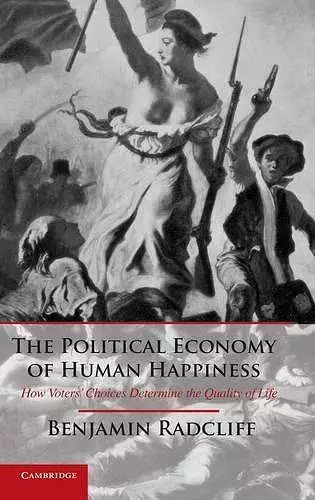The Political Economy of Human Happiness
How Voters' Choices Determine the Quality of Life
Format:Hardback
Publisher:Cambridge University Press
Published:25th Mar '13
Currently unavailable, and unfortunately no date known when it will be back
This hardback is available in another edition too:
- Paperback£22.99(9781107644427)

Radcliff examines the question of how political outcomes in democratic societies determine the quality of life that citizens experience.
Data, methods and theories of contemporary social science can be applied to resolve how political outcomes in democratic societies determine the quality of life that citizens experience. Radcliff seeks to provide an objective answer to the debate over what public policies best contribute to people leading positive and rewarding lives.Data, methods and theories of contemporary social science can be applied to resolve how political outcomes in democratic societies determine the quality of life that citizens experience. Radcliff seeks to provide an objective answer to the debate between left and right over what public policies best contribute to people leading positive and rewarding lives. Radcliff offers an empirical answer, relying on the same canons of reason and evidence required of any other issue amenable to study through social-scientific means. The analysis focuses on the consequences of three specific political issues: the welfare state and the general size of government, labor organization, and state efforts to protect workers and consumers through economic regulation. The results indicate that in each instance, the program of the Left best contributes to citizens leading more satisfying lives and, critically, that the benefits of greater happiness accrue to everyone in society, rich and poor alike.
'A growing number of social scientists and policy makers are starting to explore the implications for public policy of the newly emerging measures of happiness. I highly recommend for their consideration this pathbreaking, scholarly, and judicious work.' Richard A. Easterlin, University of Southern California
'One of the most intellectually sophisticated, empirically convincing, and politically relevant books I have read in years. Radcliff's central conclusion - that the principal determinant of the quality of human life is the degree to which public policies empower citizens against the arbitrary power of the market - could hardly be more compelling or more persuasively argued.' Alex Pacek, Texas A & M University
'This is a splendid and very courageous book. Based on an unusually impressive amount of high-quality data and using sophisticated analytical techniques, Benjamin Radcliff succeeds in answering a question that few of his colleagues have dared to pose: What type of public policies creates and increases human well-being? The answer is as profound as it is radical. In a time when the relevance of political science is under attack, this book is the answer.' Bo Rothstein, August Röhss Chair in Political Science, University of Gothenburg
'We will never agree on matters of ideological taste, but we can agree on facts. This book demonstrates how facts about happiness can be used in the ongoing debate on the welfare state. Although it may not tell the last word, it shows the way to evidence-based consensus building.' Ruut Veenhoven, Emeritus Professor, Erasmus University Rotterdam
'[T]he book provides an eloquent demonstration of how a fundamental departure in the objectives of government - aiming for meaningful and happy lives for the greatest number of citizens - underlies the origins of public policy in the United States and in modern social democracies more generally. It also shows the new tools that well-being metrics provide to assess how well different governments are doing in meeting that objective. The book is a worthwhile read for scholars and students of economics, political science, philosophy, and public policy.' Carol Graham, Journal of Economic Literature
'In The Political Economy of Human Happiness, Benjamin Radcliff poses a fundamental question for politics and political science: 'what specific public policies contribute to better lives?'. His immodest aspiration of providing 'an objective, empirical answer to this question' will rightly warm the hearts of those who see political science as a tool for social progress rather than a mere collection of intellectual puzzles.' Larry M. Bartels, European Political Science
ISBN: 9781107030848
Dimensions: 239mm x 155mm x 20mm
Weight: 490g
214 pages